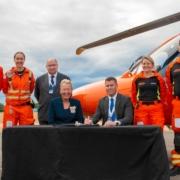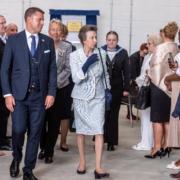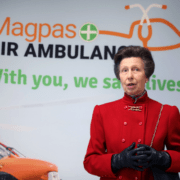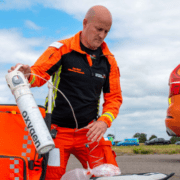Cambridgeshire air ambulance leads the way introducing new lifesaving equipment into service
An advanced piece of equipment predominantly only used in hospitals has been adopted by lifesaving charity Magpas Air Ambulance, in a bid to prevent infection and save lives across the region.
Cambridgeshire-based Magpas Air Ambulance has been pioneering advances in emergency medicine for 50 years and recently worked with the Trauma Intensive Care Unit (ICU) at Addenbrooke’s Hospital to improve survival and recovery times of intubated patients across the East of England.
Magpas Air Ambulance clinicians are trained in Pre-Hospital Emergency Medicine (PHEM) which allows them to provide patients with treatments and procedures—that are usually only available in a hospital emergency department—at the incident scene, when every second counts. One of the most common procedures Magpas Air Ambulance provides is intubation of a patient.
Intubations are required when someone can’t breathe for themselves and involves placing a tube down a patient’s throat and attaching it to oxygen, which goes directly into their lungs to keep them inflated. This protects their brain and keeps their other organs functioning by circulating oxygenated blood. These patients will then remain intubated while Magpas Air Ambulance takes them to hospital for further treatment and often, as a result of the severity of their illness or injury, they remain intubated and on ventilation for many days.
There are different kinds of endotracheal tubes used for intubation, each with a slightly different feature. The tubes currently used in the pre-hospital setting are mostly intended for short term use. In the ICU, endotracheal tubes with subglottic secretion drainages are used instead. This is because these tubes give the ICU staff the ability to suction out any build-up of fluids that could cause infections, and therefore have been shown to help prevent ventilator-associated chest infections in patients who are expected to be on a ventilator for three or more days.
Magpas Air Ambulance Doctor Adriana Cordier, who is also an intensive care and emergency medicine doctor at Addenbrooke’s Hospital, worked with other clinicians in the ICU to study this further. Over the course of 2021 they found that the majority of trauma patients in the East of England are intubated by pre-hospital critical care teams like Magpas Air Ambulance, and most of these patients remained intubated for an average of eight days and required their tube to be changed to a subglottic secretion drainage tube. Therefore, Adriana and the team identified patient care could be further enhanced if critical care teams could use the endotracheal tubes with subglottic secretion drainages in their pre-hospital practice. The aim being that once the patient is intubated by Magpas Air Ambulance, the tube will not be changed again which will reduce risk to the patient, as it’s a dangerous procedure, and help prevent infection.
Adriana took this evidence to Magpas Air Ambulance, resulting in the decision to change the tubes they use to those already used in ICU. Magpas Air Ambulance doctors and paramedics commenced use of these tubes this week for the use with all adult patients.
Magpas Air Ambulance’s Clinical Operations Manager and Critical Care Paramedic Andy Smith explains, “We currently perform an average of 200 intubations every single year, normally for patients who have suffered a cardiac arrest or traumatic injuries. Part of their ongoing care once they reach hospital will often depend on them staying intubated for a number of days until they are stable enough to breathe on their own again. Identifying that the use of these tubes could further help our patients, by potentially helping to reduce ventilator-dependent days, will thereby continue in our mission to save lives. We will be the first air ambulance in the region, and one of the first nationally, to carry this piece of equipment.”
Dr Adriana continues, “Changing these tubes will be more expensive for the charity. However, when looking at our patients’ overall journey to recovery, we recognise that by upgrading this piece of equipment, we may well improve their outcome in the long run. We do this job to give the sickest of the sick patients the best chance of survival, so even if it means we have to raise more money each year, it’s a small price to pay to ensure we’re giving our patients the best chance of survival and potentially keeping more families together.
“We will continue to work closely with the Neuro-Trauma Intensive Care Unit to discover innovative ways to improve the overall outcome of our patients.”
The charity will have to raise an extra £1,250 a year to fund this lifesaving piece of equipment. Magpas Air Ambulance relies on generous public donations to continue saving lives. If you are able to donate, please visit donate.magpas.org.uk.







